Eating
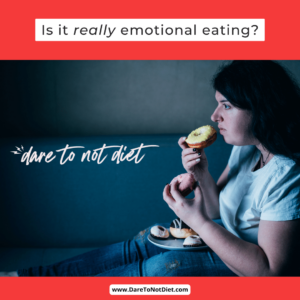
Are we really eating our feelings?
Do you identify as an emotional eater?
And if so, what does that mean to you? And is it something you feel good, bad or neutral about?
I asked chatGPT what it thought emotional eating was and it made a pretty valiant effort:
“Emotional eating is a term used to describe the practice of eating food in response to emotional triggers, such as stress, anxiety, boredom, or sadness, rather than in response to physical hunger. Emotional eaters use food as a coping mechanism to deal with their emotions and may experience a sense of comfort or relief when they eat…” -chatGPT
There was a bit more about overeating and weight gain which was not particularly scientific so I left it off. Overall I thought this was a definition most people would agree with.
But there is something missing from this definition and the reason I wanted to write about emotional eating. It doesn’t take into account how people feel about the food they are eating or their bodies. Emotional eating doesn’t happen in a vacuum.
Why emotional eating really happens
Here’s what was really happening for many “emotional eating” based on my clinical experience:
They were trying to be “good” all day with their eating by following diet rules to control their weight. They are trying to control their weight because they feel bad about their bodies.
Or, they would eat food they considered “bad” for them that they’d been trying to avoid in the name of “health” (or weight control).
But when a negative emotion happened, they’d run to the exact food they’d been trying to avoid and eat a lot of it all at once, often to the point of discomfort.
If someone is restricting either physically or mentally (creating a sense of deprivation), then negative emotions will be your body’s way of taking advantage of vulnerability to get itself fed.
Diets = Restriction
If you have been intent on avoiding dessert for most of the rest of your life in order to control your weight, this will most certainly create a sense of deprivation that your brain will translate to Starvation Alert!
That’s right – even thinking you can’t have something can make your brain fear it’s not going to get enough. Why? Because starvation has been a reality for humanity for most of our history.
So if you are in that deprivation mindset, and an upsetting emotion comes along (or maybe even an intensely happy one), and that food or something like it is available somewhere, your brain will use this moment of vulnerability to make you eat it.
And you’ll blame the emotions, because diet culture has told you it’s normal and doable to diet (it isn’t).
And then you’ll think you’re an emotional eater. But you aren’t eating your feelings; your feelings are simply getting you to eat.
In my experience, once we fix the deprivation (which I help people do using a non-diet framework that works really well), emotional eating disappears. Hunger becomes the primary driving force of eating. (Hunger cues sometimes need to be rehabbed first). And when that happens, you can be reassured you are eating the right amount for your body most of the time.
How to not emotionally eat
Get tips on how to divest yourself of diet culture and eat normally with my free guide 5 Strategies to Stop Overeating.
If you’d like to see what help for emotional eating would look like, schedule a free 30 minute chat with me. If you have BCBS, your nutrition counseling may be completely covered.
Eating
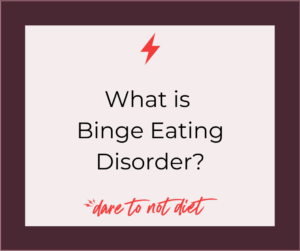
The Misunderstood Eating Disorder
Over the years I’ve narrowed my private practice to focus mostly on people with binge eating disorder (BED) or similar symptoms such as “overeating,” “mindless eating” and “emotional eating.” (I put these in quotes purposely because these symptoms are often not what people think they are). I’ve learned so much from working with people with BED, it is the most common eating disorder, and yet I feel like it’s so completely misunderstood by the general population and also clinicians (usually doctors and non-ED professionals).
Many people think this is a problem of eating to excess. Even the DSM-5 diagnosis criteria seems to assume this. Weight stigma and diet culture probably both have a lot to do with that.
So I thought it was high time I shared what I’ve learned over the years in hopes of clearing up some misconceptions.
Binge Eating Disorder Diagnosis Criteria
In 2013, Binge Eating Disorder made it into the fifth version of the Diagnostic and Statistical Manual of Mental Disorders (DSM-5) which is a publication by the American Psychiatric Association (APA) for the classification of mental disorders using a common language and standard criteria.
According to the DSM-5, diagnostic criteria for binge eating disorder include:
- Recurrent episodes of binge eating. An episode of binge eating is characterized by both of the following:
- Eating, in a discrete period of time (for example, within any two-hour period), an amount of food that is definitely larger than most people would eat in a similar period of time under similar circumstances
- A sense of lack of control over eating during the episode (for example, a feeling that one cannot stop eating or control what or how much one is eating)
- The binge-eating episodes are associated with three (or more) of the following:
- Eating much more rapidly than normal
- Eating until feeling uncomfortably full
- Eating large amounts of food when not feeling physically hungry
- Eating alone because of feeling embarrassed by how much one is eating
- Feeling disgusted with oneself, depressed, or very guilty afterwards
- Marked distress regarding binge eating is present.
- The binge eating occurs, on average, at least once a week for three months.
- The binge eating is not associated with the recurrent use of inappropriate compensatory behavior (purging, fasting, excessive exercise) and does not occur exclusively during the course of anorexia nervosa, bulimia nervosa, or avoidant/restrictive food intake disorder.
Weight or body size is not a part of the diagnosis. Like any eating disorder, a person of any size can be diagnosed with binge eating disorder. Unfortunately, other diagnosis criteria like Anorexia Nervosa do include a weight component. This is a big problem because, again, anyone of any size can have anorexia or any other eating disorder.
What the DSM Gets Wrong
I am so glad that the DSM has included this ED as its own diagnosis, but I think these criteria need to evolve. Specifically, I take issue with #5, “The binge eating is not associated with the recurrent use of inappropriate compensatory behavior (purging, fasting, excessive exercise) and does not occur exclusively during the course of anorexia nervosa, bulimia nervosa, or avoidant/restrictive food intake disorder.” I believe that if clinicians were relying on that criterion for diagnosis, few people would fit into this category.
I think this criterion leads to a lot of ineffective treatment because it assumes a person is bingeing while eating normally the rest of the time. It makes BED all about “eating too much.” In all my years treating BED, I’ve met very few people with BED who are eating enough food through the day before they binge. But because dieting is seen as “normal,” especially for higher weight people, this compensatory behavior (e.g. eating but not enough, eating foods that aren’t satisfying or enjoyable) isn’t seen as problematic. Trust me, it is.
The few people I have met who may be eating enough through the day have other things going on that are creating mental restriction. They feel shame about their weight, about the types of food they eat, about the quantity or the quality. They live in a shame bubble that tells them they are always doing eating wrong. That can translate in the brain to “the diet starts tomorrow and this food is going away.” They are always striving for compensation, in a way. Deprivation eating may follow in the form of a binge.
I haven’t yet met the client who binges without some form of past or current restriction or desire to lose weight. Compensatory actions are almost always present in the form of skipping meals the next day, “eating light” or planning the next diet.
I imagine there is some leeway in diagnosing and often clinicians are just doing their best to help their clients. But either diagnosing clinicians are ignoring this particular criterion to give a client a diagnosis that could help them get treatment (and I am fine with this because I think this criterion is not helpful) OR they may not be aware of the small-but-important compensatory behaviors the person is engaging in. That’s why a dietitian is crucial in the treatment of binge eating disorder.
The bottom line: Any compensatory behavior in the way of eating less, exercising more, or planning the next diet to control weight will just keep a person trapped in the binge cycle.
Other misunderstandings about BED
Many people with BED assume that any weight gain they experience is due to the act of bingeing. While this is always a possibility, in my experience it’s almost impossible to know what weight gain is due to if someone has a history of dieting (or worse restriction) and weight cycling. The act of dieting/restriction/weight loss destabilizes weight to varying degrees. Even without bingeing or overeating, a person who stops restricting may gain a drastic amount of weight while eating normally. Some may gain no weight at all. Genetics plays a huge role in this.
So when my clients don’t lose weight once their bingeing stops, there is sometimes disappointment. They’ve been told their entire lives that their eating made them fat, and they learn that not eating enough is “normal” (it is not). So finally eating enough may feel like “too much” for a long time, and they may feel like they are still doing eating wrong. It’s useful to have some training in helping clients learn to tolerate their bodies, a first step in improving body image. Anyone promising weight loss as a part of treatment for BED should be avoided at all costs.
I have heard (literally while in a treatment center) some clinicians express concern that a higher weight person is gaining more weight in treatment. This is a big problem. Weight is often gained in recovery and that’s not different for someone who has been restricting as a part of their binge eating disorder. They may have been suppressing their weight with the amount of restricting they were doing even while bingeing. Any focus on suppressing weight in ED treatment, including BED, is counterproductive and will worsen the ED. We also can’t control weight easily and any dietitian who has tried to get a hypermetabolic anorexic person to gain weight with food alone will attest to that. More training is needed for therapists to understand the meaning of “weight neutral” in treatment and how any focus on suppressing weight is damaging.
What Helps with Binge Eating Disorder
Treatment for BED must be aligned with the principles of HAES®. Weight control cannot be any part of treatment nor should we encourage the idea that weight control efforts should resume after treatment because this will most likely ensure a relapse.
From a nutrition standpoint, our first priority is to make sure biological hunger is met by ensuring adequate energy intake. This can be really challenging when clients often don’t experience “clear” hunger signals. It can help clients to learn that a compelling drive to eat may be a hunger signal and this is their body’s way of saving them in the absence of enough food.
The majority of my clients with BED often simply do not eat enough earlier in the day. Why? Because they’ve been taught that eating the least amount of food possible is what they should be doing to control their weights, often a lifetime effort starting in childhood.
A first line of treatment will be to start what is sometimes called “mechanical eating.” That’s eating regular meals and snacks in the absence of hunger – because hunger signals are not accurate to guide eating early on in EDs! This is often not fun or pleasant but it is effective as hell when it comes to stopping binge behaviors AND urges.
Which is an important point: the goal of binge eating disorder treatment is not to “control” binge urges but to have the binge urges cease completely so you can live a life free of food anxiety.
Working towards internally regulated eating, such as with the intuitive eating and eating competence models, is a good goal. That can take a long time as the body relearns normal hunger and fullness cues but everyone recovers at different rates.
There also may be psychological factors that trigger a binge, but in my experience, once you are adequately fed, meeting biological hunger and giving yourself permission to eat, it’s easier to work with your therapist on those restrict/binge triggers. Having both a therapist and dietitian gives you the team you need to support your recovery.
Recovery is possible
Even if you don’t qualify for a binge eating disorder diagnosis, if you suffer from several of the same symptoms, it’s worth it to seek out help.
I have many binge eating clients and the relief they experience when they see that they can learn how to be good, relaxed eaters is such a privilege to observe.
If you’re looking for more tools to help with binges or overeating problems, I have put some of my best ones, the ones I use first with clients, in this free guide, 7 Strategies to Stop Overeating.
If you’re in need of help with your eating, set up a 30 minute free call with me and we’ll see what could be most helpful.
Group Coaching Help for BED/Overeating
My Peaceful Eating Jumpstart may also be a great place to start in helping you heal from binge eating and other eating problems. Group begins February 7th and spaces are filling up and I would love to have you join us!
Start your path to normal eating with my free guide, 5 Strategies to Stop Overeating
Eating
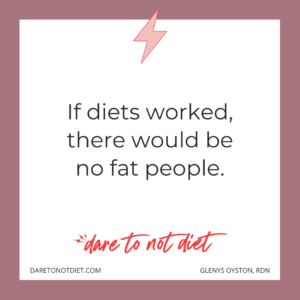
Happy new year! I hope you’ve been able to escape the onslaught of diet ads or at the very least you’ve been able to escape my least favorite . But if not and you could use some anti-diet support, I’m here to give it!
WE ALREADY KNOW DIETS DON’T WORK
Let’s start with this: If diets really worked to create long term weight loss, do you think there would be any fat people? Especially in a culture that (incorrectly) treats weight as controllable and that tells us (also incorrectly) that fat bodies are the wrong bodies to have?
No, of course not. If even just ONE of those diets worked, there would be very few fat people because it’s normal for most people to want to escape weight stigma (even if that really isn’t the answer to fixing weight stigma).
(And to be clear: I do not think the answer to anyone’s happiness is to eradicate fat bodies. The act of constantly trying to change one’s body size to feel better about it appears to me to create a lifetime of grief. Creating a world where all bodies are seen as worthy of appreciation and respect seems a better goal.)
If, say, Weight Watchers (now WW) ever really worked long term, why would they have to change their program every few years? They told us it worked in 1973, 1994, and 2022 and yet each of those years and decades features a completely different program. Why?
Because it — and all the other diets — never worked.
WHY DIETS DON’T WORK
To be more precise: most of the diets work for a bit, then they don’t. If you need proof, this is a great summation of the research around weight loss stretching back to 1959 .
Weight loss doesn’t work because the body defends itself against what it determines is a famine (not enough food), slows the metabolism and increases fat storage capability.
That is why people lose weight and then regain weight — either some, all or more than they lost in the first place. Diets will always fail because our bodies want to survive. Our bodies don’t know there is a current cultural preference for thin bodies. It just thinks it might die and weight regain is literally life-saving.
There are so many things you can do to help your health. Dieting IS NOT one of them. You can work on well-being no matter what size you are. It will look different for different people, and outcomes and goals will always differ and that’s okay.
Want to hear more on this subject? Check out this classic Dietitians Unplugged episode, Why Your Weight Loss Diet is a Bad Idea.
I wish you a year of true well-being and no diets!
Do you struggle to eat normally and peacefully?
The Peaceful Eating Jumpstart can help you go from chaotic eating to feeling relaxed about food! Early bird pricing is in effect until Friday, January 13th, 2023. Make this lucky Friday the 13th and save $100. Come join us and feel good about eating!
Start your path to normal eating with my free guide, 5 Strategies to Stop Overeating
Eating
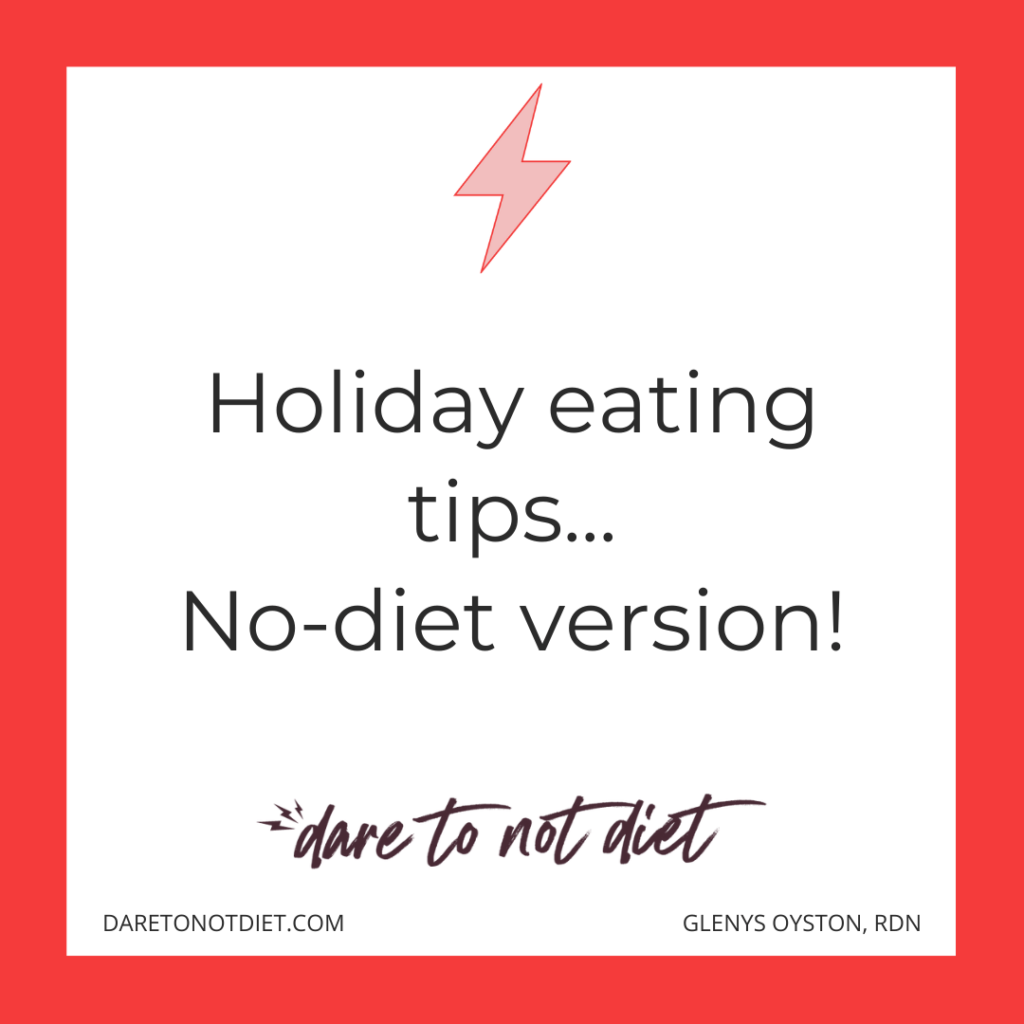
If you google “Holiday Eating Tips” there is no end of diet garbage that comes up.
Holiday diet eating tips that deny you types and amounts of food also deny you the pleasure of the season. And let’s remember that diets don’t work anyway!
Instead, here are my tips for relaxed and fun holiday eating.
⚡ Ignore all advice that is rooted in a negative attitude toward eating. That includes “portioning” (just another way to restrict), avoiding certain food groups or macronutrients, or trying to trick yourself out of eating what or how much you really want. Strive instead for a positive attitude toward eating, which means nourishing yourself, trusting your body, and enjoying food.
⚡ Give yourself regular meals and snacks throughout the day. So many people coming from diets and disordered eating don’t feel their hunger until it is so intense it’s unpleasant. That can make eating unpleasant, too, when you need to eat so much so fast. Diet tricks like “saving your calories” can lead to arriving at a meal ravenous and then overeating and feeling sick. Regular, good tasting meals and snacks will enable you to eat exactly what you want at all the special meals and feel well doing it.
⚡ Eat exactly what and how much you want of the foods you enjoy. Permission is the name of the game. Your brain and body need to know they can get enough of what they want so you can calm down and eat enjoyably. So many people think this is counterintuitive but research shows that unconditional permission to eat enables us to eat the right amounts for our body. Why? Because eating is internally regulated – not externally!
⚡ Set some loving boundaries for yourself and others. While I don’t recommend you police everyone’s conversation for diet talk, you don’t have to participate. You can remain silent, or try to subtly change the subject, or politely leave the conversation. You can also participate by stating your views. (“I don’t do diets anymore, want to hear about it?” is probably a great conversation stopper! Be prepared for disagreement.). You can set a firm boundary that friends and family members don’t talk about your body. Simply state, “My body [size, shape, health] is not available as a topic for conversation.” Then change the subject. Remember no one has to agree with you, nor you with them. “Agree to disagree” is a great way to end uncomfortable conversations.
I hope you get to spend your day with people you enjoy eating food that is good! If you’d like to hear even more on the topic, check out this classic Dietitians Unplugged episode about holiday eating!
Do you struggle to feel good about eating?
The Peaceful Eating Jumpstart can help you go from chaotic eating to feeling relaxed about food! Early bird pricing is in effect and another BIG bonus is available when you enroll by Friday, December 30th. Come join us and feel good about eating!
Start your path to normal eating with my free guide, 5 Strategies to Stop Overeating
Eating
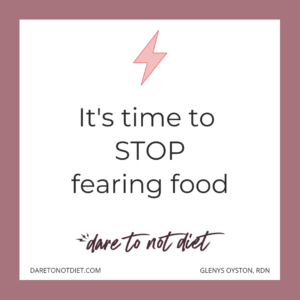
It’s the time of year when many people will be involved in holiday celebrations that largely center around food. I think this is a great thing! Yummy, special food with people you (hopefully) enjoy or love.
Sadly, there is something that conflicts with this potential joy, and it’s this:
We are a society that has become afraid of food.
We fear carbs and fat because we were told (over and over) those foods will make us fat (they don’t).
We fear processed foods because ingesting even the tiniest amount will kill you before you even read middle age (it won’t).
We fear sugar even though it’s delicious and gives us pleasure in eating and we’ve been eating it for most of human history in some form or other and our bodies run on glucose.
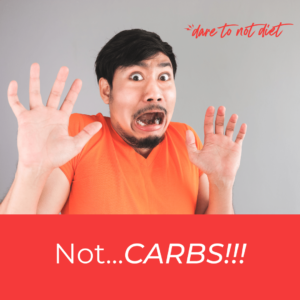
We even fear some fruits and vegetables because some diet guru told us they have the “wrong” combination of whatever in them (too much sugar!).
We fear the modernity of food and food processing. Only the ancient food is okay for us. We must live like the ancients. The food we eat now is bad and modern and processed.
And underlying all these fears is the ongoing fear of being fat. A 2000 year tradition despite 2000 years of no one finding a way to permanently turn the majority of fat people into thin people.
We Crave Control
Behind our food fears and our quest for weight loss lies the real reason we succumb to diet culture. A deep desire to control…something. To compensate for what feels like frightening and uncontrollable times – personally, nationally or globally. And we have been in some weird times.
But this doesn’t work.
Controlling our food doesn’t represent actual control, and there is no evidence that living at Level Red Fear Alert around food is making us healthier.
It’s not making life more enjoyable, which is also important for health. Food fear does not improve diet quality or control the bad things – it just makes it harder to eat normally and enjoyably and actually healthfully.
So what can we do about this?
We can decide to stop fearing food.
When you stop fearing food, you can start doing things like:
- Learn to enjoy all the foods you like and end up healthier as a result
- Make life goals centered around living and that don’t involve food you can’t eat
- Take actions to achieve those goals because you’re brain isn’t constantly thinking about food
- Have fun with friends at a restaurant, leave perfectly satisfied, and have only good memories, not guilt
- Enjoy food with your family, and watch your children become competent eaters without fear
In order to overcome food fear, you need to understand that your body wants to be healthy with food and to regulate weight on its own. It helps you do that through its desire for a variety of food and honoring hunger and fullness. But it can only realize that kind of attunement when you’re eating regular, reliable, rewarding meals that you enjoy and you are allowed to eat as much of those meals as you want. (Yes, I said “want”)
Give yourself the gift of trusting your body to live without the rules so you can actually enjoy eating this holiday season!
Start your path to normal eating with my free guide, 5 Strategies to Stop Overeating
Ready to get help with your eating problems? Schedule a chat with me and we’ll figure out exactly what you need.
Eating
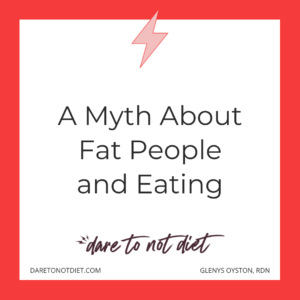
There exists a myth that all people in larger bodies are this way because they eat too much.
While it is possible that this is why some people are in larger bodies, it is simply not true for all people who are fat (I use fat in a neutral way to simply describe a body size).
To be perfectly clear, it is no one’s business why someone is the body size they are. But the problem with this myth is that it assumes 1. Body size can be permanently changed for most people (it can’t) and 2. No matter how much a fat person eats, it’s always too much.
That is why insanely restrictive diets exist: if someone was simply overeating, they’d just have to stop, not restrict, to lose weight. But simply eating in a balanced, normal way has not been shown to produce weight loss.
The majority of my clients have restricted much more than they have overeaten in their lives. They dieted for years and their restriction shocks even me, myself a former dieter. How little they ate, how much they cut out – it is truly shocking. Based on their histories, most were never overeaters to begin with.
Perhaps now they have overeating problems but this is not what is causing their weight gain.
What caused their weight loss on diets was not the absence of overeating, but the absence of enough food. What has inevitably contributed to their weight regain over the years is the weight loss (because this is the body’s way of saving itself from future “famines” aka diets).
Many started out at what the BMI considers “normal weight” but through many diet attempts and weight cycles, they have stair-stepped their weight up beyond their original set point range. This, and not overeating, is more likely why they are now at a higher weight. Their overeating now is simply a reaction to not enough food.
There can be many reasons for weight variance including illness, restriction, overeating and nature, with genetics probably playing the biggest role. Regardless of the reason for someone’s weight, we need to stop trying to make that the thing we change. Trying to permanently change larger people into smaller people isn’t working and is leaving them with serious eating problems.
Myths like these are dangerous and uphold diet culture, and make no one healthier or happier in the long run.
Start your path to normal eating with my free guide, 5 Strategies to Stop Overeating
Eating
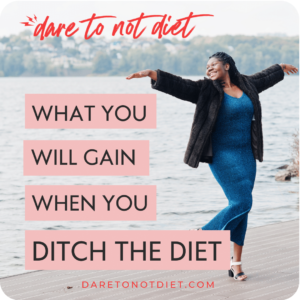
Perhaps you’ve been hearing all about intuitive eating these days and you’re considering ditching your diet at last. Excellent decision!
It should be no surprise by now that dieting is harmful. But in case it is, here is a quick recap: Most people (up to 95%) regain some, all or more weight than they lost in the first place. This is really the least harmful effect of dieting, because it’s your body saving your life from starvation.
The more detrimental effects are:
- Chaotic eating
- Nutrient deficiency
- Loss of lean body mass (muscles and bones)
- Energy depletion
- Food obsession
- Orthorexia
- Anxiety, decreased self-esteem, depression, irritability, and nervousness and physiological stress
So if you are sick (maybe literally) and tired of the terrible diet cycle, here are just a few reasons to quit dieting forever.
Reasons to ditch your diet
You’ll stop obsessing over food
You know all that thinking about food you do when you’re losing weight or maintaining weight loss? That’s because you’re hungry. Or because you feel bad about eating certain foods. Both physiological and mental restriction cause a feeling of deprivation, which your brain and body want to solve by eating everything. Once you start eating to appetite and honoring hunger and fullness cues, that food obsession will disappear and you’ll have so much more time to think about other things. It can take some time and practice to come into alignment with those cues, so don’t try to rush this process.
You will stop feeling guilty and eat all foods normally
Without any foods off-limits, you’ll start to actually enjoy the food you eat, which can now be any food. Wouldn’t it be nice to kick back with a delicious pizza and just relax and enjoy it? Have some ice cream without feeling bad the rest of the afternoon? Yes, you will learn to do that. And you’ll eat them in amounts that are right for your body because you’ll be listening to your body.
You’ll have more energy
Food is what gives you energy and you will have more of it when you are eating intuitively! Especially when you include more carbohydrates! Thanks to the disastrous low-carb/no-carb trend of the past 20 years, most dieters skimp on carbs all day. Many of my clients blame their energy depletion on weight gain. But when they start to eat enough again, they stop feeling so exhausted. Imagine what you could do with just some of that energy!
You will be healthier
Intuitive eating and eating competence are both validated models that show that people are healthier when they eat this way. Over the long term, as people really settle into normal, sustainable eating patterns, we see improvements in most health markers. For conditions that require some gentle nutrition, that can be accomplished more easily when you’re eating enough food.
Your self-esteem will improve
This one happens with intentional work. Basing your worthiness on your ability to attain thinness leads to fleeting self-esteem at best. Instead, you can develop body appreciation and recognize that weight stigma, not your body, is the problem. You can base your worth on the person you are, not what you look like. This is the reason I also include body image coaching in my work.
You will stop the cycle of weight loss and regain
Gaining weight over a lifetime is normal. But a wildly ping-ponging weight due to dieting has been shown to be detrimental. Stable weights are typically correlated with lower mortality rates. Without weight cycling, the changes will more likely be smaller and incremental compared to the weight change that happens with weight cycling (aka yo-yo dieting).
You’ll gain so much time to do the things you want to do
On a diet, you might spend a lot of time managing and obsessing about your food. When food becomes just another piece of routine self-care, you’ll think just enough about it to get yourself fed well. Then you’ll have leftover time to plan and do the things you want in life. Active body image work will help you to stop waiting to be a certain size to really live life fully.
Let’s face it: dieting makes no one happier or healthier in the long run. It doesn’t work and it harms your health. It’s time to ditch the diet. With a little effort, you’ll see the benefits are worth it!
Need some help eating normally and feeling better about your body?
If you want to explore what a life free of diets could look like for you, book a free consultation now and we’ll talk.
Start your path to normal eating with my free guide, 5 Strategies to Stop Overeating
Eating
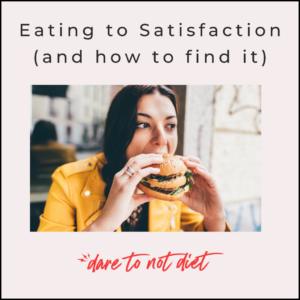
Does the idea of eating to satisfaction confound you?
If you’ve struggled with being on and off diets, the idea of feeling “satisfied” at the end of a meal might be really hard to grasp.
Because the concept of satisfaction in itself is nuanced.
You can be full, but not satisfied.
(think of eating a huge salad when what you really felt like was a cheeseburger)
Or, you can be satisfied, but not necessarily full.
(think of a really rich food you enjoy that you find you can’t eat much of all at once*)
And sometimes, you can be both full AND satisfied. It’s a nice, comforting feeling.
But here’s the problem: you can really only experience satisfaction if you aren’t starving all the time.
If you are trying to limit how much you eat to control your weight, you are more likely to swing between always-hungry and too-full. And if you are coming off the diet, you may spend a LOT of time in too-full mode.
What to do?
First, make sure you are well-fed. Adequate nutrition isn’t about eating as little as possible (in fact, that’s called “poor nutrition”). Make sure you’re getting regular, filling meals throughout the day. Find your hunger first and honor it. Then you can practice listening for satisfaction.
It may prove elusive at first, but with enough time and practice (and no judgment), you’ll begin to learn to eat with satisfaction. It’s a delicious feeling!
*if you are actively dieting, you may not be able to experience this right now
Start your path to normal eating with my free guide, 5 Strategies to Stop Overeating
Eating
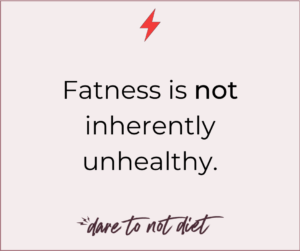
Let’s talk about the lie that fat bodies are inherently unhealthy.
The whole, complex and nuanced truth is: fat bodies can be unhealthy or healthy. Thin bodies will be unhealthy or healthy.
In our current society, however, we will blame poor health on fatness, and good health as a result of thinness.
This is called weight stigma.
Janet Tomiyama’s research showed the uselessness of BMI in determining health status. BMI as a diagnositic tool dramatically over-diagnosed fat people as unhealthy and under-diagnosed thin people as unhealthy. Clearly, using BMI helps no one at the doctor’s office.
Fat bodies are often under attack from childhood. Chronic food restriction, over-exercising, weight cycling and the effects of weight stigma are harmful to health. Studies that correlate illness with fatness rarely consider the effects of chronic dieting and weight stigma. These are confounding factors.
Behaviors (such as exercise) — more than size — have a greater impact on health, and the evidence is clear on this. That means eating well and fitness and taking care of the various other parts of life can support our health. Many people can do this. Many can’t. As always, health is not a measure of anybody’s worthiness.
Let’s remember: Health is complicated and means different things to different people and is not always 100% within our control.
Ignore the lies of diet culture that tell you fatness is inherently unhealthy and cause you to do worse things for your health (like dieting). Do your best with doing healthy things (which do not include restriction) and leave the rest — like size and shape — up to your personal biology.
Need help with eating?
Wondering where to start with working on “health?” If years of dieting has left you with a chaotic relationship to food, that’s the place to begin. The Peaceful Eating Jumpstart small group coaching program starts September 6 and is filling up fast! Come and join us if your eating needs help! Details here.